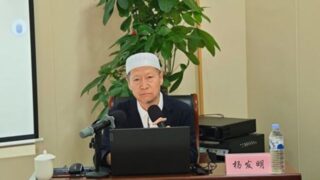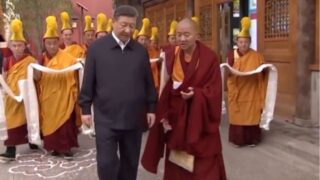
In a conversation with a friend, the teacher had expressed exhaustion with the local government and disapproved of the CCP’s policies. As a result, he lost his job, and his colleagues at school are subjected to strict control.
In August, Chen Qiang (pseudonym), a middle school teacher from Xinjiang’s Kashi prefecture, was chatting online with a friend. The two were discussing the government’s home-stay program, as per which employees of government-run institutions, including schools, are forced to live with and indoctrinate Uyghur families. At one point, Mr. Chen wrote, “It’s exhausting to be a government functionary in Xinjiang. If Chen Quanguo stays for ten years, we’ll be in for dark times for these years.” Chen Quanguo is the current Communist Party Secretary of the Xinjiang Uyghur Autonomous Region.
Soon after, Chen Qiang was seized by the police and questioned. The local government and the party committee leadership ordered the school to dismiss him.
Days later, the school authorities held a meeting to discuss rules regarding the teacher’s activities on WeChat and QQ – two of the most popular social networking sites in China.
The school’s Party committee secretary stressed that teachers are not allowed to discuss online topics such as Muslim festivals or holidays or social stability maintenance in Xinjiang. They were warned to be careful using words like “exhausted” as well. Anyone found posting “sensitive information” would be discovered and punished, along with the online group chat’s administrator.
Ever since the episode with Mr. Chen, local officials have visited the school to supervise its headmaster on his work with the staff about the relevant CCP’s policies. As a result, the teachers are frequently instructed about the protocol of online chatting. Moreover, their cell phones and social media accounts are randomly checked.
Mr. Chen’s colleague at the school said to the reporter, “He was just telling it like it was. He did nothing wrong. Being arrested for something like this, and receiving a notice for dismissal — it’s practically a deprivation of the right of free speech.”
He added, “We’re already tired after the classes. On top of that, we have to participate in the home-stay program and go on patrol duty. And we are not even allowed to talk about how tired we are. We cannot take vacation time, and we are not allowed to quit. We are expected to obey unconditionally. If we don’t, in the best-case scenario, we’ll be sent for indoctrination, in the worst – to prison. Why can’t we talk about these injustices openly?”
According to sources, a school in Changji city instructed its teachers on the home-stay program not to use terms like “Ramadan,” “fasting,” and “taken into custody,” while uploading the results of their stay with Uyghur families on the government online platform. They were instead told to use codes such as ZD (for key personnel), SJ (for someone taken in for “studying”), and SY (for detention).
The school management has also repeatedly emphasized that the teachers must be extremely cautious and consistent in answering questions asked by home-stay families.
For example, if the relatives of detained people inquire about the date on which they would be released, the teaching staff must say, “This is to help them. It’s to teach them Mandarin, the law, and other skills.” They cannot tell the truth, i.e., it will take more than a couple of years.
Reported by Li Zaili









